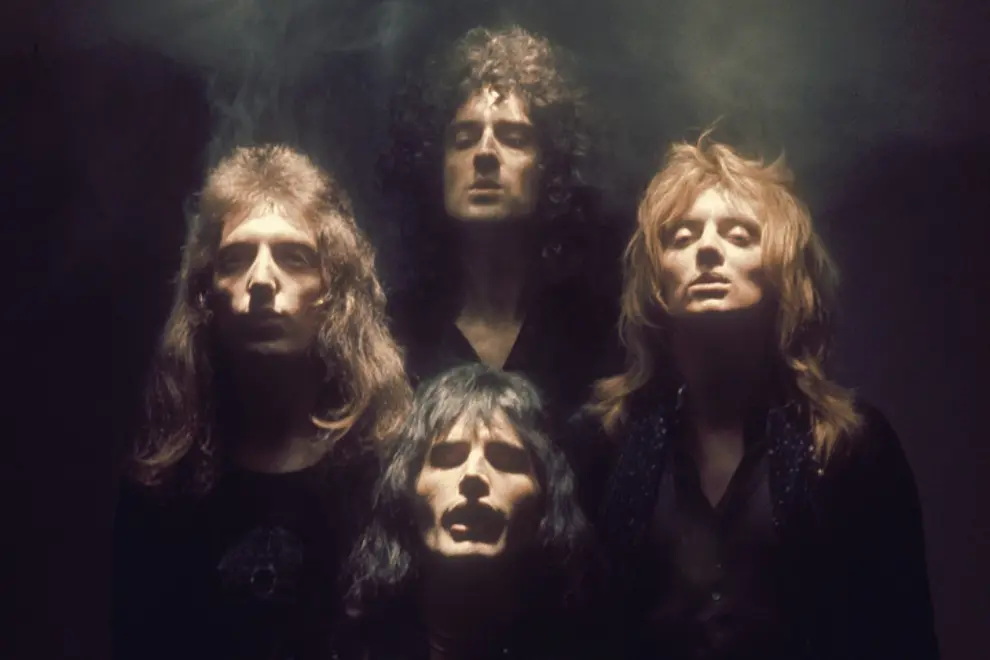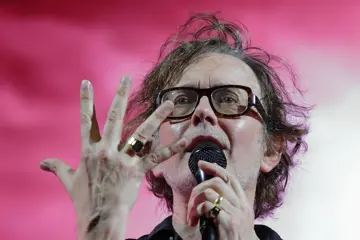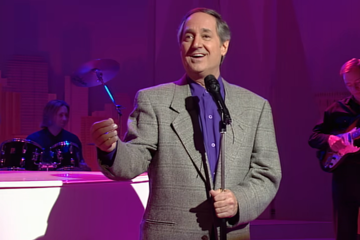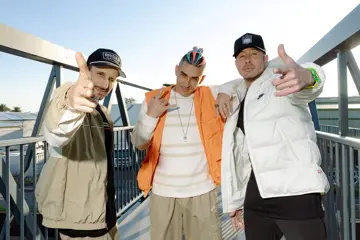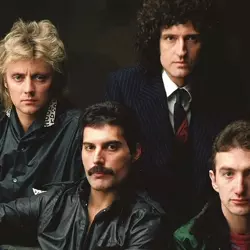 Queen
QueenWhen Queen appeared in Australia for the first time, at 1974’s Sunbury Festival, they were greeted by cries of “Go home, ya Pommy wankers” and more.
The rowdy reception rocked the band. As they exited the stage, Freddie Mercury had a farewell message for the crowd: “When we come back to Australia, Queen will be the biggest band in the world!”
He was true to his word.
“When Freddie said, ‘We’re going to be the biggest band in the world’, the crowd was like, ‘Oh, bullshit!’,” recalled The Masters Apprentices’ Jim Keays, who was the MC at Sunbury ’74.
“But it was funny, because they ended up being the biggest band in the world.”
When Queen returned to Australia two years later, they were at the top of the charts with the groundbreaking Bohemian Rhapsody, which was released 50 years ago this week.
A rock musical in just one song, it even blew Brian Wilson’s mind. “I studied the record,” the Beach Boys leader revealed. “I became very familiar with it. And I’m very, very fond of it and scared of it at the same time.”
Don't miss a beat with our FREE daily newsletter
Mike Myers was 12 when Bohemian Rhapsody was released. Growing up in Toronto, he heard the song in his brother’s Toyota Corolla and then followed its progress as it rocketed to number one on the Canadian charts.
Seventeen years later, Myers demanded that the song open his first movie, Wayne’s World. The producers wanted to use Guns N’ Roses’ Welcome To The Jungle, but Myers said he would quit if the opening sequence didn’t feature Bohemian Rhapsody.
Sadly, Freddie Mercury died three months before Wayne’s World was released.
The movie saw the song soar to number two in the US (kept out of top spot by Kris Kross’s Jump), besting its 1976 peak of number nine, and resurrecting Queen’s career in America.
Queen’s record company famously didn’t want to release Bohemian Rhapsody in 1975, believing it was too long.
Mike Myers leapt at the chance to perform a cameo in the Queen biopic Bohemian Rhapsody, playing the EMI executive who tells the band: “It goes on forever, six bloody minutes!”
The Freddie Mercury character responds, “I pity your wife if you think six minutes is forever.”
The record company exec suggests that I’m In Love With My Car would be a better single. “Well, that’s the kind of song teenagers can crank up the volume in their car and bang their heads to. Bohemian Rhapsody will never be that song.”
Bohemian Rhapsody ended up being the first single from Queen’s fourth album, A Night At The Opera.
At the time, Queen and Elton John were both managed by John Reid. Legend has it that Elton told Reid, “Are you mad? You’ll never get that on the radio!”
The record company wanted to edit the song. “They said it was too long and wouldn’t work,” Queen drummer Roger Taylor recalls. “But we thought, ‘Well, we could cut it, but it wouldn’t make any sense.’ It doesn’t make much sense now, and it would make even less sense then; you would miss all the different moods of the song.”
Freddie insisted, “It either goes out in its entirety or not at all.”
“It was a big risk,” he reflected a decade later. “It was either going to be a big flop, because nobody would play it, or something would happen.”
The only known official edit of the song was a French seven-inch released in 1978, which cut more than two minutes, to end up with a running length of 3.41.
When the band was told that the radio wouldn’t play a six-minute song, Freddie Mercury gave a copy to his friend Kenny Everett, a DJ at London’s Capital Radio. Kenny also shook his head when he saw how long the song was. Then he played it.
All doubts were dispelled. “Forget it,” Kenny exclaimed. “It could be half an hour long, it’s going to be number one for centuries!”
Kenny played it on the air. And then he played it again. And again. The switchboard went into meltdown. EMI was forced to release Bohemian Rhapsody as a single.
“That’s the modern version of Beethoven,” Kenny declared when he back announced the song. “Ooh, my spine’s turned to custard … love it.”
Bohemian Rhapsody topped the UK charts on November 29, 1975, and stayed there until January 31, 1976, when it was replaced by ABBA’s Mamma Mia (an ironic chart quirk, given that the Queen song features the line, “Mamma mia, mamma mia, mamma mia, let me go!”).
Bohemian Rhapsody became the first single to top the UK charts twice, when it returned to number one in December 1991, following Freddie’s passing. It spent a further five weeks on top.
Musicologists have broken Bohemian Rhapsody into six sections: the introduction, ballad, guitar solo, opera, rock and an outro.
Roger Taylor recalls that “we were trying to be a heavy rock band, then Freddie came to us with this outrageous concoction”.
He still laughs when he remembers the singer saying, “Now, my dears, this is where the opera section comes in.”
When asked about Bohemian Rhapsody, Brian Wilson said: “It’s just totally amazing what people do when they lose their noggins. When they lose their heads and go in there and freak. That’s exactly what Queen did.”
The song was produced by Roy Thomas Baker, who died in April this year. “Bohemian Rhapsody was totally insane,” he said. “It just got bigger and bigger. It started off as a ballad, but the end was heavy.”
The band did that many overdubs, the master tape became so thin, you could see through it.
And then there was that video.
Ian “Molly” Meldrum will never forget the day he saw the Bohemian Rhapsody clip for the first time.
“I was totally gobsmacked; in fact, the whole Countdown office was,” Molly says.
“You have to remember that videos weren’t a big factor in the recording industry back then. England hardly used them – Top Of The Pops was the major show in England, and that was all live – Europe used them a little bit, while America didn’t use them at all.”
Molly believes the clip is “without a doubt the pioneer of video-making”.
Directed by Bruce Gowers – and shot in just four hours – the Bohemian Rhapsody video cost £5000 to make.
In Australia, Bohemian Rhapsody was the second-biggest single of 1976, behind ABBA’s Fernando.
Queen guitarist Brian May says two previous recordings paved the way for Bohemian Rhapsody. “We were well in tune with Freddie’s excursions into strange areas, and that was something that we really enjoyed.”
There was My Fairy King on the band’s 1973 self-titled debut.
And Queen II featured another six-minute epic, March Of The Black Queen.
Freddie’s working title for his new song was “Mongolian Rhapsody”. But he crossed out Mongolian and replaced it with “Bohemian”.
In 1985, Freddie spoke to Molly Meldrum about the song’s creation. “It was a phase we were going through at the time. We were just writing like crazy; there was so much hunger there, we just had so much that we wanted to bring out.
“Bohemian Rhapsody was basically like three songs that I wanted to put out, and I just put the three together.”
Eight years earlier, Molly had spoken with Freddie about the band’s Sunbury debacle. “Coming in out of the cold to do a headline was kind of difficult,” the singer admitted.
“I know at the time we had a lot of competition from the Australian groups there. It was a very difficult time for us.”
But Freddie believed the adverse reaction helped Queen become a better band. “It’s something you just learn by experience; I think it was a good thing to do. Rather than just do a slow build-up, we’d just come in and say, ‘We’re Queen, this is what we’re all about.’ It’s nice to sort of go in at the deep end.”
Of course, Queen were no one-hit wonders. Aside from ABBA, the biggest-selling best-of in Australia is Queen’s Greatest Hits, which has sold more than one million copies.
Track one is Bohemian Rhapsody.
Queen opened their unforgettable Live Aid set in 1985 with Bohemian Rhapsody.
Freddie Mercury reportedly said, “You can do what you want with my music, but don’t make me boring.”
“Weird Al” Yankovic turned Bohemian Rhapsody into a polka song on his Alapalooza album.
Elton John and Axl Rose joined Queen to do the song at the Freddie Mercury Tribute Concert in 1992.
The Muppets delivered their version in 2009, tweaking some of the lyrics, omitting the line “Mama, just killed a man”, and changing the back-and-forth section to Fozzie Bear pleading, “Let me joke,” and Statler and Waldorf replying, “We do not like your jokes!” And the song ends with Miss Piggy declaring, “Nothing really matters but moi!”
The Muppets’ cover was a Top 40 hit in the UK.
A strange mix of Aussie acts have also had a go at the song.
The Cruel Sea covered Bohemian Rhapsody on their Rock’n Roll Duds album, which was released 30 years ago next month.
The Wiggles delivered their take on the track on their ReWiggled album in 2022. Like The Muppets, The Wiggles reworked the “Mama, just killed a man” line.
And Australia’s Pub Choir has done Bohemian Rhapsody – with 102,974 singers.
A Zulu version – authorised by the surviving members of Queen – was released earlier this year.
American star Benson Boone performed the song at this year’s Coachella – joined by Brian May on guitar.
A Parisian flash mob has already clocked up more than 16 million YouTube views in the past month.
And last month, Brian May and Roger Taylor joined the BBC Symphony Orchestra and Chorus, BBC Singers and National Youth Choir to mark the song’s 50th anniversary.
There’s also a Bohemian Catsody parody.
Academics and musicologists have pondered what Bohemian Rhapsody really means.
“Scaramouche, Scaramouche, will you do the Fandango?”
“Freddie was a very complex person,” Brian May explained. “Flippant and funny on the surface, but he concealed insecurities and problems in squaring up his life with his childhood. He never explained the lyrics, but I think he put a lot of himself into that song.”
Some have speculated that the song was Freddie’s coming-out anthem. Lesley-Ann Jones, who wrote a Mercury biography, put that proposition to the singer. She says he didn’t give a straight answer, admitting only that it was “about relationships”.
The author claims that Freddie’s former lover Jim Hutton told her the song was the singer admitting he was gay.
Freddie’s friend Tim Rice – best known as Andrew Lloyd Webber’s lyricist – believes the secrets are revealed in the lyric:
“Mama, just killed a man” – that’s the singer killing the “old Freddie”, the man he was trying to be.
“Put a gun against his head, pulled my trigger, now he’s dead” – the old “straight” Freddie is gone.
“I see a little silhouette of a man” – he’s coming to terms with his sexuality.
“Every time I hear the song, I think of him trying to shake off one Freddie and embracing another,” Rice says.
The song also has a religious element, mentioning Beelzebub – the Devil – and Bismillah, which translates as “In the name of God”.
And did Freddie include the Italian astronomer Galileo as a nod to his buddy Brian May, who later got a PhD in astrophysics?
Lesley-Ann Jones says that “Galileo, Figaro, Scaramouche – all those classical references that he [Freddie] loved – represented the other members of the band. They were surrounding him, protecting him from the outside world, but also from himself, as he was a very fragile creature.”
“What is Bohemian Rhapsody about?” Brian May pondered on Queen’s Greatest Hits DVD. “Well, I don’t think we’ll ever know, and if I knew, I probably wouldn’t want to tell you anyway, because I certainly don’t tell people what my songs are about. I find that it destroys them in a way because the great thing about a great song is that you relate it to your own personal experiences in your own life.
“I think that Freddie was certainly battling with problems in his personal life, which he might have decided to put into the song. He was certainly looking at re-creating himself. But I don’t think that at that point in time it was the best thing to do, so he actually decided to do it later.
“I think it’s best to leave it with a question mark in the air.”
Freddie told Kenny Everett the song was just “random rhyming nonsense”. He also said it “means whatever you want it to mean”.
The authors of the book 1000 UK Number One Hits mused: “How can a meaningless song mean so much to so many people?”
Queen came to Australia only three times with Freddie Mercury – the ill-fated Sunbury show, followed by 1976’s A Night At The Opera tour and 1985’s The Works tour. At Melbourne’s Entertainment Centre in 1985, the singer asked the crowd if any of them had been at Sunbury. When a few fans yelled “yeah”, Freddie smiled and said, “Fuck you!”
Bohemian Rhapsody was the ultimate revenge. The UK’s third-biggest single of all time (after Elton John’s Candle In The Wind 1997, and Do They Know It’s Christmas?). The most-streamed song from the 20th century. A song that still “sends shivers down my spine”.
Magnifico.

